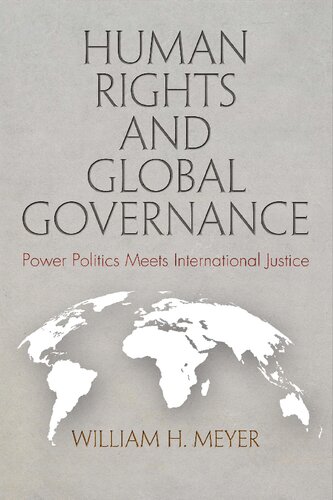

Most ebook files are in PDF format, so you can easily read them using various software such as Foxit Reader or directly on the Google Chrome browser.
Some ebook files are released by publishers in other formats such as .awz, .mobi, .epub, .fb2, etc. You may need to install specific software to read these formats on mobile/PC, such as Calibre.
Please read the tutorial at this link: https://ebookbell.com/faq
We offer FREE conversion to the popular formats you request; however, this may take some time. Therefore, right after payment, please email us, and we will try to provide the service as quickly as possible.
For some exceptional file formats or broken links (if any), please refrain from opening any disputes. Instead, email us first, and we will try to assist within a maximum of 6 hours.
EbookBell Team

4.7
16 reviewsInternational human rights have been an important matter for study, policy, and activism since the end of World War II. However, as William H. Meyer observes, global governance is not only a relatively new topic for students of interational relations but also a widely used yet often contested concept. Despite the conflicting and often politicized uses of the term, three key dimensions of global governance can be identified: the impact of diplomatic international organizations such as the International Criminal Court, the importance of nonstate actors and global civil society, and global political trends that can be gleaned from empirical observation and data collection. In Human Rights and Global Governance, Meyer defines global governance generally as the management of global issues within a political space that has no single centralized authority.
Employing a combination of historical, quantitative, normative, and policy analyses, Meyer presents a series of case studies at the intersection of power politics and international justice. He examines the global campaign to end impunity for dictators; the recognition, violation, and protection of indigenous rights; the creation and expansion of efforts to ensure corporate social responsibility; the interactions between labor rights and development in the Global South; just war theory as it applies to torturing terrorists, war crimes in Afghanistan and Iraq, and the drone wars; and the global strategic environment that best facilitates the making of human rights treaties. Meyer concludes with an evaluation of the successes and failures of two exemplary models for the global governance of human rights as well as recommendations for public policy changes and visions for the future.